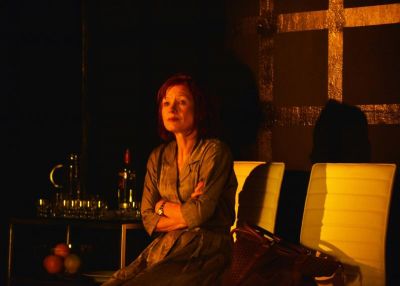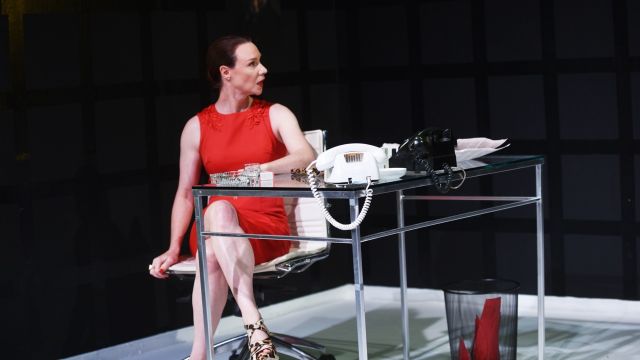Splendour
Red Stitch continues to push the envelope, though its choices of plays may not be to everyone’s taste. Still, it’s marvellous that they continue to give us national premieres of plays we may not otherwise see.
It’s also interesting that there are THREE plays currently on stage in Melbourne that are driven by female casts and all directed by females (The 3rd is Q44’s excellent production of Sister Cities). Hopefully this is indicative of a resurgence of women in theatre. Certainly, when you put the combined amazing talents of Belinda McClory and Olga Makeeva together on stage, supported by Rosie Lockhart and Olivia Monticciolo, you know that the performances will be exemplary.
So, superb acting from four wonderful actresses, a cold stark set that has exactly the right tone, and a text (albeit an early one) from the writer of The Iron Lady and Suffragette (among others); what more could anyone ask?
Well, you might ask that there be some sense of emotional connection grow between characters as their shared fate intensifies; that the playwright had not used reportage, and the doubling back re-enactment of scenes to get a different perspective, in such a pretentious way; that a little more time was spent in exploring the characters in depth, that the play wasn’t so emotionally disconnected and icy-cold; that it offered more of an emotional journey with true insight rather than an intellectual wank; but these are personal preferences.
 The “rewind” device may have seemed clever in 2000 when Morgan wrote the play, but it is now a device we’ve seen so many times (think Groundhog Day) that it has become old hat. And whilst Groundhog Day reveals the inner journey of the main character, and an emotional progression, Splendour simply reveals a few more details of the background. No-one is changed, no-one is truly revealed.
The “rewind” device may have seemed clever in 2000 when Morgan wrote the play, but it is now a device we’ve seen so many times (think Groundhog Day) that it has become old hat. And whilst Groundhog Day reveals the inner journey of the main character, and an emotional progression, Splendour simply reveals a few more details of the background. No-one is changed, no-one is truly revealed.
The shortcomings of the text aside, Red Stitch has done a wonderful job with a flawed play.
Set in a Dictator’s palace where a western photographer has arrived to photograph the Dictator as a violent revolution escalates outside; four women await the inevitable.
Micheleine (Belinda McClory) is a monster, fascinating, beautiful, but a woman who has sacrificed her humanity for love. McClory is compelling to watch, with total command of the audience as well as the other characters. Dripping venom encased in icicles, we believe her Micheleine capable of anything. If we saw her in the street we would cross to other side, so dangerous does she appear beneath the designer wardrobe and the glamorous veneer. It is she who provides the tension and sense of menace throughout the play. There are glimpses of softness, vulnerability and real love for her husband and grandson (though seeming disregard for her daughter) but they are so subtle they might be missed. Overall, Micheleine is a frightening creature realised to perfection by the actress. (Why is it the worst women wear Prada? Because they can!)
One interesting point about the actress. Her makeup on the poster includes full eye make-up, which softens her face, makes her very attractive. In performance McClory has gone for full red lips and very little eye makeup. That makes her eyes more narrow, more menacing, with the redness of the lips promising blood in every mirthless smile. It’s a clever little trick to be applauded, though many may not be conscious of it.
 Olga Makeeva continues to be rock (albeit a petite one) at the centre of the Red Stitch ensemble. As Genevieve she is the only character to show a real transition and growth in her arc. As always, Makeeva understands every nuance and gives an impeccable performance filled with subtlety and integrity. With every replay she is freshly doused with water (rain) and each time she perfects the illusion that it’s the first time. It’s true to say that Russia’s loss is Australian theatre’s gain. How I would love to see her and the wonderful Marta Kazmareck together in a play. She’s quite wonderful.
Olga Makeeva continues to be rock (albeit a petite one) at the centre of the Red Stitch ensemble. As Genevieve she is the only character to show a real transition and growth in her arc. As always, Makeeva understands every nuance and gives an impeccable performance filled with subtlety and integrity. With every replay she is freshly doused with water (rain) and each time she perfects the illusion that it’s the first time. It’s true to say that Russia’s loss is Australian theatre’s gain. How I would love to see her and the wonderful Marta Kazmareck together in a play. She’s quite wonderful.
Rosie Lockhart, though impressive, fares less well as the outsider….the photographer…scarred by all she has seen of inhumanity. She doesn’t seem quite haunted enough throughout, nor surprised or concerned that she might be killed before her photograph is delivered. It’s a small thing, but she seemed ill at ease on the second night (the actress, not the character), but second night nerves are common after the euphoria of an opening.
Olivia Monticciolo gives an interesting performance as Gilma, the petty thief translator from the North, masquerading as a graduate from The University of California. She brings a lighter touch, but a darker subtext to the situation. She’s an actress of great variety and I look forward to her next play.
Jenny Kemp talks in her director’s notes about the play exploring the effects of power, both patriarchal and political, on women. Whilst Micheleine does appear to have been corrupted by her Dictator husband, and has her own superficial power, overall the resounding conclusion is that these four women, different though they are, are all victims….physical victims of the revolution, and emotional victims of relationships, and the circumstances of their lives. Interestingly, this is a play which becomes more interesting the more you think about it. Those plays are rare.
Coral Drouyn
Photographer: Jodie Hutchinson
Subscribe to our E-Newsletter, buy our latest print edition or find a Performing Arts book at Book Nook.

